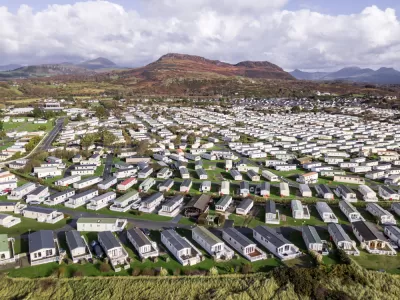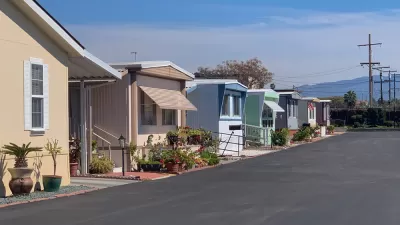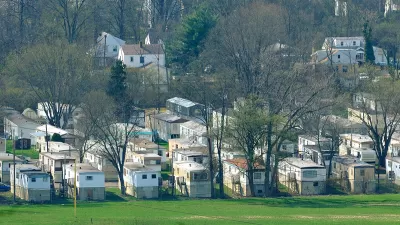With demand surging and rent costs rising sharply, mobile home parks are becoming unaffordable for their most vulnerable residents.

In an article for The Washington Post, Abha Bhattarai highlights growing fears among mobile home residents as rent increases hit mobile home parks around the country. “Surging home prices and rents are cascading down to the country’s mobile home parks, where heightened demand, low supply and an increase in corporate owners is driving up monthly costs for low-income residents with few alternatives.” As we noted in a story last year, “private-equity firms and developers are often circling nearby, looking to buy up such properties and turn them into more lucrative ventures, including timeshare resorts, wedding venues and condominiums.”
With roughly 20 million Americans living in manufactured homes, rising costs for this historically affordable housing option are putting some of the country’s lowest-income households in peril of losing their homes. Although many mobile home residents own their trailer, rising land rents, the cost of moving a mobile home, and a lack of regulations on mobile home rent in most cities put mobile home owners in a precarious position.
“The circumstances surrounding mobile homeownership are yet another way the housing market has worsened long-standing inequities,” Bhattarai writes. “While homeowners enjoyed cheaper mortgages during the pandemic, loans for buying manufactured homes often come with higher interest rates, limited opportunities to refinance and fewer protections than those for typical mortgages, according to a Consumer Financial Protection Bureau report.”
FULL STORY: ‘We’re all afraid’: Massive rent increases hit mobile homes

Planetizen Federal Action Tracker
A weekly monitor of how Trump’s orders and actions are impacting planners and planning in America.

Chicago’s Ghost Rails
Just beneath the surface of the modern city lie the remnants of its expansive early 20th-century streetcar system.

San Antonio and Austin are Fusing Into one Massive Megaregion
The region spanning the two central Texas cities is growing fast, posing challenges for local infrastructure and water supplies.

Since Zion's Shuttles Went Electric “The Smog is Gone”
Visitors to Zion National Park can enjoy the canyon via the nation’s first fully electric park shuttle system.

Trump Distributing DOT Safety Funds at 1/10 Rate of Biden
Funds for Safe Streets and other transportation safety and equity programs are being held up by administrative reviews and conflicts with the Trump administration’s priorities.

German Cities Subsidize Taxis for Women Amid Wave of Violence
Free or low-cost taxi rides can help women navigate cities more safely, but critics say the programs don't address the root causes of violence against women.
Urban Design for Planners 1: Software Tools
This six-course series explores essential urban design concepts using open source software and equips planners with the tools they need to participate fully in the urban design process.
Planning for Universal Design
Learn the tools for implementing Universal Design in planning regulations.
planning NEXT
Appalachian Highlands Housing Partners
Mpact (founded as Rail~Volution)
City of Camden Redevelopment Agency
City of Astoria
City of Portland
City of Laramie





























